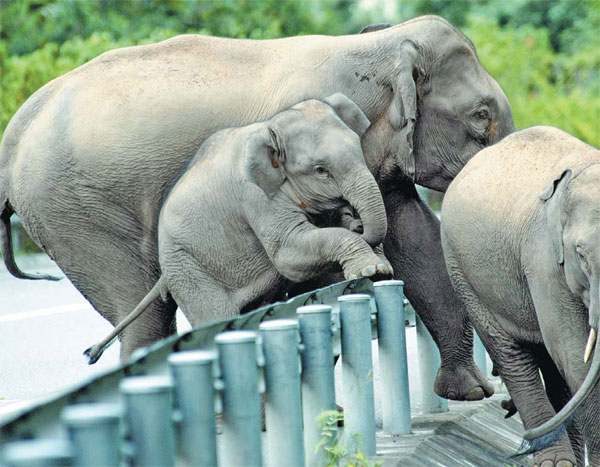Man vs Nature
Updated: 2014-03-02 07:47
By Erik Nilsson in Yushu, Qinghai, and Hu Yongqi in Kunming, Yunnan (China Daily)
|
||||||||
Many parts of China with the best ecology endure the worst conflicts between humans and animals. Erik Nilsson in Yushu, Qinghai, and Hu Yongqi in Kunming, Yunnan, explore the frontlines of where the wild things are.
A bear set Baige's house on fire. Nearly all the nomadic Tibetan herder's possessions were incinerated when the animal knocked over his stove while raiding his food stores in Longma village in October 2012, he says. The 39-year-old had moved the stove in front of the door when he left home specifically to keep bears out. They frequently break in to gobble his pantry's stash. But since the furnace blocked the entrance, the bear had to knock it out of the way to get in, he explains. Baige says he'd underestimated the resolve the creature's appetite compelled.
Officials came to snap photos to document the damage and tally his destroyed valuables - mostly furniture, sheepskins and jewelry.
Officials gave Baige bedding, a new door and cash.
"But the compensation didn't cover the damage," he says.
While the fire may seem like a freak accident, the nomads sprinkled across the vast grasslands surrounding Qinghai province's Yushu say they're constantly in conflict with wild animals.
Baige, who like many Tibetans only has one name, lives about 300 kilometers from the nearest township of about 150 households.
Bear burglaries are commonplace, Yege township's head of human resources Resang says. A bear damaged the 41-year-old's TV.
Baige says he has lost count of how many times they've looted his food.
He places the fire damage at 350,000 yuan ($57,700) and says he was given 100,000.
"People tried to kill the bears, but the government wouldn't let them," Baige says.
"My younger brother and relatives have confronted the bears. They were lucky the bears ran away."
Wolves also take locals' sheep.
And feral mastiffs prowl in packs, sometimes biting elderly people and forcing children indoors at night. Students aren't allowed to walk a few hundred meters to the recently constructed latrine after sunset. They must relieve themselves outside, next to their dorms.
But such conflicts between wildlife and humans aren't confined to western Qinghai's frosty highlands.
The steaming valley of Yunnan province's Xishuangbanna Dai autonomous prefecture is home to China's last wild elephants and rare monkeys, which devour - and sometimes decimate - farmers' crops.
And the trampling death of a 45-year-old woman in July is the latest such incident.
Jin Baofeng and her husband Ren Ming-you were walking to their rice paddy in the forests outside Jinghong city when the herd charged.
Ren escaped. He found his wife's body when he returned to find her.
Police discovered the herd nearby. Forensic experts confirmed the giant mammals were responsible for her death.
The reserve's Asian elephant population has nearly doubled in the past decade because of improved ecological protection and the confiscation of locals' guns, Wild Elephant Valley's management bureau says.
But the animals have killed at least 20 people during those 10 years.
Another problem is that elephants love corn. Adults eat at least 150 kilograms of food a day and often feast on the crops in Mengla county's Nanping village.
Villagers complain they're not adequately compensated despite doing their part to protect the pachyderms. Compensation for a kilogram of rice eaten by elephants, for instance, is 1 yuan - less than a third of the market value.
Compensation has improved since 2006, when Xishuangbanna's government squeezed 570,000 yuan from its modest revenue to reimburse losses caused by elephants.
Since the following year, the central government has given the prefecture 5 million yuan annually to cover damage by elephants.
But the protected species devours more than 30 million yuan worth of crops a year, the government says. The disparity directs a preference for paying families whose relatives are trampled over those who lose crops.
Residents of northern Yunnan's Diqing Tibetan autonomous prefecture also grapple with losses incurred by protected species.
Black bears and wolves plunder livestock and crops, local forestry bureau senior technician Wu Zongsan says.
But villagers can't "fight back" or kill them.
The more than 700 patrol officers hired by the bureau are also occasionally attacked by wildlife, Wu says.
Patrol officer Qi Hai says he has encountered several black bears in the past year.
"Our ecology's improvement means more animals live long enough to become adults," the 29-year-old explains.
"These animals need more food for themselves and their offspring. That's why some raid the fields. Therein lies the dilemma. I don't know how they could flourish without their human neighbors."
That's Qi's assessment of the ecological reality.
But his other evaluations are more practical.
"If you encounter a bear, you'd better pretend to be dead," he says.
"That's your best bet."
Yege Primary School's former principal Youngdingqupai says an unintended benefit of the proliferation of wild bears has been increased school attendance in Yushu's Qumalai county. He recalls two students who encountered a bear on the road when they ran away from school.
"They were so frightened, they promised to never run away again," he recalls.
"And they didn't. Nobody has since."
Wolves, however, are a major problem at neighboring Qumahe Primary School, where he's now headmaster. They've killed more than 40 sheep in the school's pasture since he took the post two years ago, he says.
"It hurts the students," the pasture's herder Tsehangdorge says.
"They need meat. Predators take their meat."
Youngdingqupai says the school simply doesn't have the 10,000 yuan to build a wall to protect the herd. It didn't even have much electricity until a nonprofit agency donated solar panels last summer.
Wolves take three to five sheep a year from Yege school's pasture, the herd's shepherd Suonambtsering says.
"I've heard the government will give us up to 800 yuan in compensation if wolves kill our sheep and we take a picture," the 48-year-old resident of Longma village says.
"But we can't take pictures. Nomads don't have cameras."
The local market value for a sheep is about 1,000 yuan, he adds.
"I have to worry about predators constantly, whether I'm walking outside or sitting at home. I have to wake up in the middle of the night to check my sheep. Sometimes, two or three wolves come. All you can do then is run away. They've bitten nomads and even killed some elderly people."
He says there's little locals can do since the animals are protected.
"This is a vast and wild place," 31-year-old Tsehangdorge says.
"There are a lot of wild animals like wolves. And the predators aren't as afraid of us as they used to be."
That's a huge problem for those who dwell on the Qinghai-Tibet Plateau, where the elevation and temperatures make farming impossible.
"Livestock is everything to us nomads," says 39-year-old Tani, from Qumalai's Darmar village.
"We must protect them."
Tani says he yells from the mountainsides to scare off wolves in the daytime.
But he's helpless on the winter nights.
"I sleep with my sheep in summer, but it's too cold in winter," he explains.
"I saw wolves take two sheep one winter night. I was so angry but couldn't do anything. I wished I had a gun to kill them. The other sheep ran away, leaving me alone on the mountain."
Another night, he awoke after a blizzard to find the carcasses of six sheep killed by wolves.
"I couldn't sell the meat," Tani says.
"People won't eat meat from animals killed by wolves. I've heard you can get compensation but never got any. Even if you could get it, it would be too much for the government. There are too many nomads, and wolves kill our livestock every day. Locals could be richer without the wolves."
Despite the economic losses, dangers and frustrations, Tani supports protecting the animals.
"As a Tibetan and a Buddhist, I believe death doesn't discriminate," Tani says.
"It comes to everyone - humans and animals. So, we shouldn't kill predators."
Contact the writers through erik_nilsson@chinadaily.com.cn.
|
Several wild elephants cross the Sixiao Highway, which runs across the Xishuangbanna nature reserve from Simao to Xiaomengyang in Yunnan province. Li Yunsheng / Xinhua |
(China Daily 03/02/2014 page1)

 Gorgeous Liu Tao poses for COSMO magazine
Gorgeous Liu Tao poses for COSMO magazine
 Post-baby Duchess
Post-baby Duchess
 Victoria Beckham S/S 2014 presented during NYFW
Victoria Beckham S/S 2014 presented during NYFW
 'Despicable' minions upset Depp's 'Lone Ranger' at box office
'Despicable' minions upset Depp's 'Lone Ranger' at box office
 'Taken 2' grabs movie box office crown
'Taken 2' grabs movie box office crown
 Rihanna's 'Diamonds' tops UK pop chart
Rihanna's 'Diamonds' tops UK pop chart
 Fans get look at vintage Rolling Stones
Fans get look at vintage Rolling Stones
 Celebrities attend Power of Women event
Celebrities attend Power of Women event
Most Viewed
Editor's Picks

|

|

|

|

|

|
Today's Top News
28 dead in Kunming rail station violence
China rejects US GM corn shipments
China finds huge oil, gas deposits
Putin cleared for force in Ukraine
Houston-China bonds deepen
Apple Inc sues China on IP
Climate law summit started in DC
China issues report on US human rights
US Weekly

|

|









